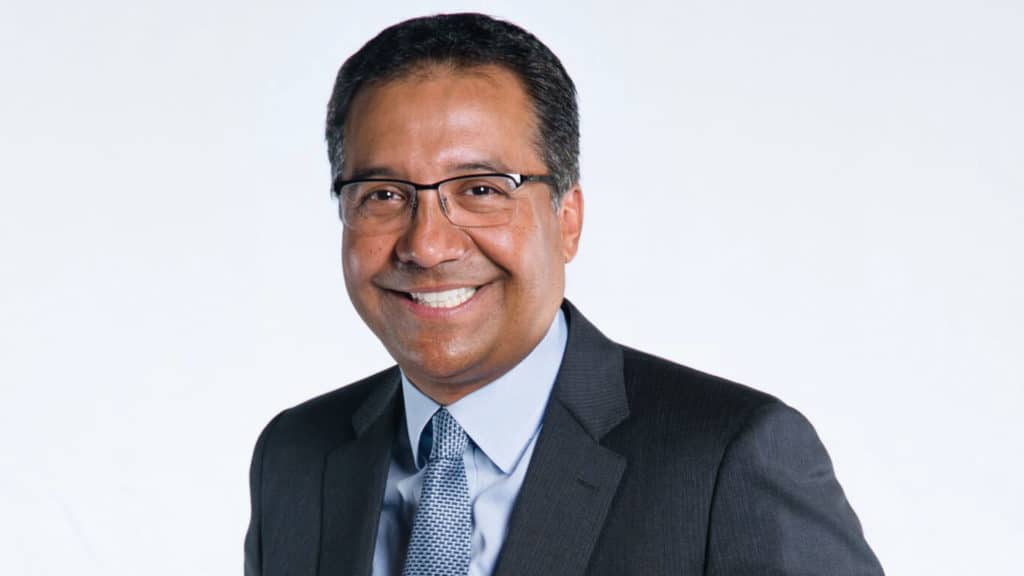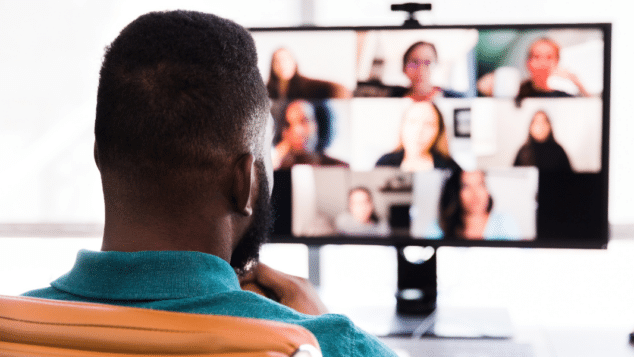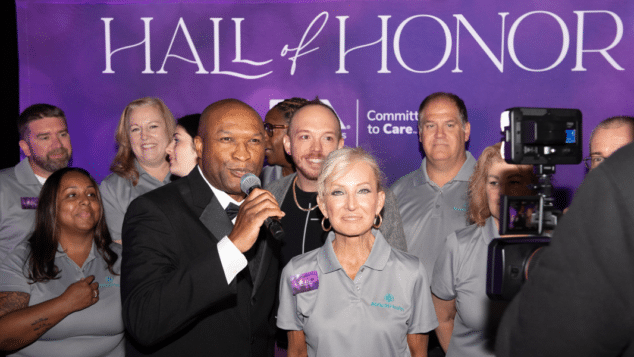Meeting in the Lap of Luxury

When Michael Dominguez was 15 years old, he worked at the Hyatt Regency San Antonio Riverwalk. It was his very first job in hospitality. On July 8, 2019, Dominguez took over the top spot at Associated Luxury Hotels International (ALHI), becoming only the fourth CEO of the 33-year-old organization. With headquarters in Boston and Plano, Texas, ALHI is a global sales organization dedicated to the meeting and incentive marketplace, and as its new leader, Dominguez has big plans.
Previously, the industry veteran served as senior vice president and chief sales officer for MGM Resorts International, and as vice president of global sales at Loews Hotels. We spoke to Dominguez about his new role, trends in the meeting industry, what association leaders can do to get the most out of their meetings, and what the future of the meeting industry holds.
FORUM: You were with MGM Resorts International for seven years. Can you tell us about your recent move to ALHI?
DOMINGUEZ: Honestly, I was just minding my business at MGM when the Chairman of the Board at ALHI approached me to see if I’d be interested in this role. Apparently, he’d spoken to many of our members and customers about the best person for the job, and my name came up almost unanimously, he said. I’ve been a member of ALHI for 14 years, so I’m very familiar with its reputation and its market. It was a great opportunity to jump into the luxury market, and it’s not every day that you get the chance to be the CEO. I’m thrilled for the chance to run the organization. It’s an exciting time to be able to do this work, and while I’ve worked with larger hotels during my career, I’ve worked with independents most of my life, and that experience has prepared me for this.
One of the first things I did was move our sales and marketing headquarters from Orlando to Plano, Texas, which is a suburb of Dallas. The move was two-fold. First, we needed to be more strategically located, and I can travel from here very easily. We need to be flexible, and we can do that here. Plus, lots of other big industry organizations, as well as Fortune 500 companies, are headquartered here, so the Dallas area just makes sense for us.
But the second part of the move is much more personal. My mother was diagnosed with Parkinson’s disease a year ago, and my parents live in San Antonio, which is an easy 45-minute flight from here. It’s still early, and she’s still very active, but I try to make every effort to spend as much time with her as possible.
FORUM: What do you hope to achieve in this new position?
DOMINGUEZ: Overall, my goal is to ensure that we are driving more value to our hotel membership and solving for more of the nuanced issues that may be unique to our members. We need to find ways to continue to drive our marketplace while connecting our clients with our hotel members in an effective and productive way. And we need to remove friction in our engagement with both our member hotel community as well as our partners and clients.
FORUM: What trends are you seeing when it comes to meetings?
DOMINGUEZ: First, there is a great deal of focus on content delivery and what we refer to as “meeting architecture.” We’re not just looking at the physical environment, but the mental environment and how to best engage our attendees. For example, it used to be that a classroom-style setting for a meeting was the norm. But now, there’s a shift toward mixing different types of environments and different formats that enable us to deliver the content in the best way possible. The keynote is still important, but it’s no longer the most important thing.
Also, content is no longer king. Context is king. I can Google anything to get the information I need, so it’s up to organizations to tell me why their information is important, why is it relevant to my interests and what does it mean for me? Today, it’s all about context, rather than content.
In that same line of thinking, attendees want more organic content, more open dialogue. They want to have an experience, but they also want to learn the good, the bad and the ugly. For instance, a famous keynote speaker at an event we hosted several years ago canceled only 12 hours before his scheduled speaking engagement. Because of the excellent coordination between my team and the hotel, we were able to reconfigure a lunch experience that went over really well. We began the lunch session by telling everyone about what happened with the speaker, and invited them to stick around at the end of the meeting—which we ended 30 minutes early—to hear about how we pulled it all off. Turns out, more than 600 people stayed, and over half of them had experience with a last-minute speaker cancellation. They truly enjoyed the opportunity to learn, and it was real and truthful.
Another trend I’m seeing is taking the meeting and letting it live beyond the four walls of the meeting room. Organizations are taking the discussions and learnings from the meeting and making it part of an online community that is fully engaged. Because of social media today, you can now have content that lives on and continues to engage people. The companies that are doing it best have online communities for employees and members where they’re asking questions and surveying people to get even more information out of the original meeting. If cost is an issue, some companies opt for a Facebook or LinkedIn platform. Wherever you decide to host your community, it’s important for the conversation to be organic. You can start the dialogue, but you’ll have to let folks go wherever they go, whether it’s positive or negative. You need to know what they’re saying—you can’t afford not to. So, this is a trend I definitely expect to see more of in the future.
FORUM: What should associations be aware of when they are planning meetings in the coming year?
DOMINGUEZ: I don’t think we’re talking enough about the REAL ID program, which goes into effect in October 2020. It’s going to sneak up on people, and could potentially cause problems for a lot of meeting professionals. Only a small percentage of the population even knows the program exists. My fear is that people will be missing meetings all over the country because they didn’t have their REAL ID on time. We need to work diligently to let our members know that it’s time to take action.
On an international level, there are definitely things that could be problematic for meeting professionals, but we still don’t know for sure. First, having an unsettled trade war with China could pose problems moving into the future. We really need resolution there. We also need resolution with Brexit. Whatever happens with that will determine the European economy, the global economy and how we trade with the U.K. At this point, it’s anybody’s guess, but these two issues could seriously impact meeting attendance and spending next year.
FORUM: What can association leaders do (or how can they prepare) to get the most out of their meetings?
DOMINGUEZ: The question I want association leaders to ask is: How can we consistently get great feedback from attendees or potential attendees regarding what they want to get out of the meeting? We tend to move forward with big assumptions about how the audience wants to receive our information, but we can do better. It’s common to send out surveys in the mail asking for feedback after a meeting, but that’s too easy to ignore. Why not survey attendees now while they’re in the room still? And with the right technology, you could do it quickly and even for free.
Feedback is important because it’s like listening to your customers, only your attendees are your customers. Knowing what they want, what they don’t want, what makes them happy and what their individual needs are is the only way to stay relevant today. For so long, associations have tried to be everything to everybody, but I think we should drill down even further, break everyone into smaller groups, and figure out specifics, like: What is it exactly that you want to learn? Then, deliver that.
FORUM: What type of relationship and/or communication should association leaders have with the hotel or meeting site?
DOMINGUEZ: It is important to have a conversation on objectives for the meeting. What are you truly trying to accomplish? In some instances, the program may be setting strategy, or looking for engagement/team building or a program that drives the financial health of the organization. Knowing that in advance will help the hotel/site to assist you in accomplishing those goals.
FORUM: Are hotels offering any new or interesting amenities to attract meetings?
DOMINGUEZ: I see a lot of hotels looking at very progressive technologies that will help with engagement. I also see them looking at creating physical environments that are more conducive to collaboration. In general, there’s a greater focus on mindfulness and behavioral science when it comes to delivering meetings. For example, science tells us that the average adult attention span is approximately 20 minutes. So, why are we still using keynote speakers who deliver two-hour addresses? Hotels and other meeting professionals should embrace smaller, shorter sessions with more breakout sessions.
FORUM: What are the changes you’ve seen during your time in the industry?
DOMINGUEZ: There have been so many over the years, but the biggest and most exciting change I’ve seen is the advancement of the profession of the meeting professional. Meeting professionals have been around for a while, but they used to have to fight for a seat at the table. Now, they are seen as an integral part of sales and marketing and a way to achieve an organization’s objectives. I’m thrilled for this change.
Another big change is how we see our audience. We used to have “attendees” at meetings, but now we have “participants.” We used to talk “to” them, whereas now we talk “with” them. It’s a much more engaged, interactive and organic exchange.
And, of course, the advancement of production and production values is another big change. Meeting participants want to be entertained these days, which means rolling out all of the technology. We have to create exciting environments now; that has become an expectation.
FORUM: Looking to the future, what are your predictions for the industry in the next decade or two?
DOMINGUEZ: I always think that it is difficult to understand what the world will look like in a decade, as the speed of change will ensure that what I know now as a lens will look extremely different in 2029. I think the continued advancement of technology will allow for a more productive and engaged meetings community as a whole. Artificial intelligence, specifically, will allow us to customize the meetings experience like we never have before. To think of the ability to have educational programming that feels like it was just for you is an exciting thought and not far from reality.
Tags
Related Articles
Double Your Footprint: Enhancing Conferences with a Hybrid Event Workflow
By combining on-site engagement with a digital experience, hybrid events can attract diverse audiences, boost...
The Emergency Nurses Association Utilizes Design Thinking to Reimagine its Awards Ceremony
In a prime example of intrapreneurship, the ENA utilized design thinking to innovate within the...
Top Ten Skills Needed to be a Meeting Planner of the Future
Now, more than ever, meeting planners need to be flexible and savvy. Read on for...




